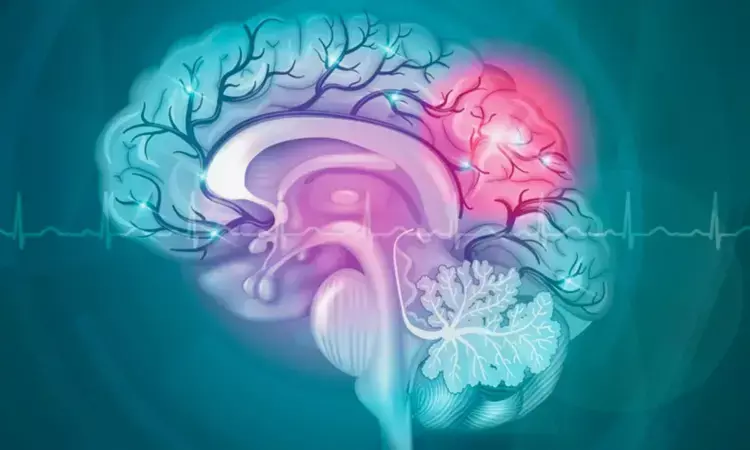- Home
- Medical news & Guidelines
- Anesthesiology
- Cardiology and CTVS
- Critical Care
- Dentistry
- Dermatology
- Diabetes and Endocrinology
- ENT
- Gastroenterology
- Medicine
- Nephrology
- Neurology
- Obstretics-Gynaecology
- Oncology
- Ophthalmology
- Orthopaedics
- Pediatrics-Neonatology
- Psychiatry
- Pulmonology
- Radiology
- Surgery
- Urology
- Laboratory Medicine
- Diet
- Nursing
- Paramedical
- Physiotherapy
- Health news
- Fact Check
- Bone Health Fact Check
- Brain Health Fact Check
- Cancer Related Fact Check
- Child Care Fact Check
- Dental and oral health fact check
- Diabetes and metabolic health fact check
- Diet and Nutrition Fact Check
- Eye and ENT Care Fact Check
- Fitness fact check
- Gut health fact check
- Heart health fact check
- Kidney health fact check
- Medical education fact check
- Men's health fact check
- Respiratory fact check
- Skin and hair care fact check
- Vaccine and Immunization fact check
- Women's health fact check
- AYUSH
- State News
- Andaman and Nicobar Islands
- Andhra Pradesh
- Arunachal Pradesh
- Assam
- Bihar
- Chandigarh
- Chattisgarh
- Dadra and Nagar Haveli
- Daman and Diu
- Delhi
- Goa
- Gujarat
- Haryana
- Himachal Pradesh
- Jammu & Kashmir
- Jharkhand
- Karnataka
- Kerala
- Ladakh
- Lakshadweep
- Madhya Pradesh
- Maharashtra
- Manipur
- Meghalaya
- Mizoram
- Nagaland
- Odisha
- Puducherry
- Punjab
- Rajasthan
- Sikkim
- Tamil Nadu
- Telangana
- Tripura
- Uttar Pradesh
- Uttrakhand
- West Bengal
- Medical Education
- Industry
Optimum antithrombotic therapy for primary and secondary prevention of ischemic stroke- Salient features

USA: A recent state-of-the-art review published in the Journal of the American College of Cardiology has provided a comprehensive summary of the currently available evidence on antithrombotic therapy for ischemic stroke. It also outlines an updated therapeutic algorithm to support physicians in tailoring the strategy to the individual patient and the underlying stroke mechanism.
Stroke is a medical emergency with significant mortality and morbidity worldwide. Antithrombotic therapy plays an important role in both primary and secondary prevention of stroke events, In cases of small-vessel disease and large-artery atherosclerosis, single or dual antiplatelet therapy is generally preferred, whereas in conditions of blood stasis or hypercoagulable states that mostly result in red thrombi, anticoagulation is recommended. However, there is a need to weigh the benefit of antithrombotic therapies against the increased bleeding risk that can pose significant challenges in the pharmacological management of this condition.
The following are key points from the review on antithrombotic therapy for primary and secondary prevention of ischemic stroke:
- Decisions regarding antithrombotic treatment in primary and secondary stroke prevention should always involve consideration of the individual patient’s bleeding risk.
- Dual antiplatelet therapy (DAPT) with clopidogrel and aspirin or ticagrelor and aspirin is indicated for a short time (~21 days) after minor acute ischemic stroke or transient ischemic attack. Antiplatelet monotherapy should be initiated after the short course of DAPT is completed.
- The default treatment for secondary stroke prevention should be an antiplatelet agent (e.g., aspirin or clopidogrel monotherapy), generally initiated within 24-48 hours after symptom onset.
- Decisions regarding the timing of initiation or reinitiation of anticoagulation for AF after ischemic stroke should be informed by infarct size, evidence of hemorrhagic transformation, and patient-specific factors (e.g., presence of comorbid deep vein thrombosis).
- Ischemic stroke patients with nonvalvular atrial fibrillation (AF) and no contraindication should receive anticoagulation with a DOAC or warfarin.
- The treatment of choice for secondary stroke prevention after ESUS (embolic stroke of undetermined source) is antiplatelet monotherapy.
- Anticoagulation with warfarin is the treatment of choice for left ventricular thrombus to prevent stroke and/or systemic embolism.
- Anticoagulation is generally the antithrombotic treatment of choice for antiphospholipid antibody syndrome and recurrent ischemic stroke felt secondary to malignancy-related hypercoagulability.
- Either aspirin or warfarin may be used in the first 3 months after a vertebral or carotid artery dissection.
The review stated, "There is a need for more research to define optimum antithrombotic regimens for patients with embolic stroke of undetermined source, arterial dissection, and specific forms of nonatherosclerotic vascular disease."
Reference:
Antithrombotic Therapy for Primary and Secondary Prevention of Ischemic Stroke: JACC State-of-the-Art Review. J Am Coll Cardiol 2023;82:1538-1557.
Dr Kamal Kant Kohli-MBBS, DTCD- a chest specialist with more than 30 years of practice and a flair for writing clinical articles, Dr Kamal Kant Kohli joined Medical Dialogues as a Chief Editor of Medical News. Besides writing articles, as an editor, he proofreads and verifies all the medical content published on Medical Dialogues including those coming from journals, studies,medical conferences,guidelines etc. Email: drkohli@medicaldialogues.in. Contact no. 011-43720751


